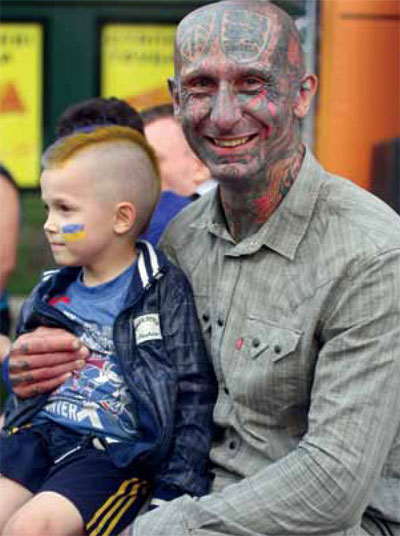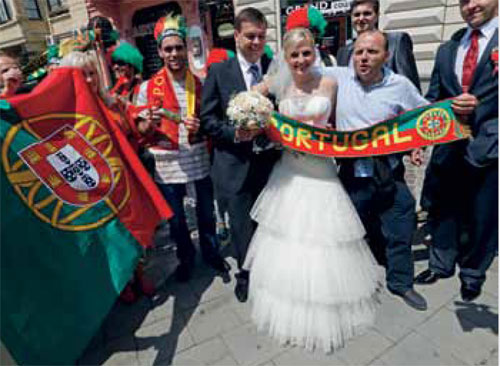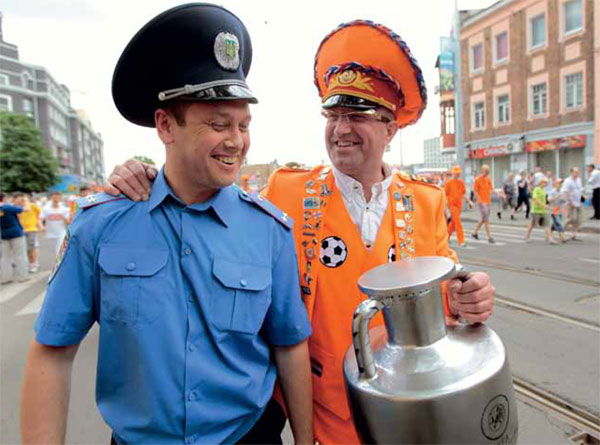Post-Euro 2012 Ukraine resembles an insecure girl who suddenly realized that she is actually pretty. The surge of masochism that swelled into a tsunami prior to the tournament abated after the first football games, erupting into a fountain of patriotism, if only temporary, formal and football-driven. A lot of Ukrainians did their best to appear civilized for foreigners during the football fest. As a result, the people – and not the Potemkin villages built by the authorities – were crucial to foreigners’ impressions of Ukraine. Common Ukrainians did their best to help their country conceal its miserable soviet remnants and discouraging political situation.
Sometimes, though, the warm-and-fuzzy show looked too good to be true. Everyone in Ukraine knows that the outstanding tolerance of the police during Euro 2012 was only for foreigners. If a Ukrainian ever tried to urinate on a downtown flowerbed or put a policeman on his shoulders, as Dutch fans did in Kharkiv, he would end up in big trouble. The disparity in police treatment of Ukrainians and foreign fans is perhaps most striking in this example from Donetsk: a fan of Shakhtar, the Donetsk team, said that city police officers raped a local man with a baton. “The guy was just walking home after work,” he added. “Meanwhile, foreigners can pee anywhere in the city center.” Wary of persistent tension between Ukraine and Europe and the plummeting popularity of the ruling Party of Regions, the Ukrainian government was clearly trying to prove its efficiency and stage a show of democracy. The police were apparently instructed to leave European guests alone, so they turned a blind eye to their misdeeds. However, it is unlikely that this experience prompted Ukrainian police to realize that spontaneous behavior from young people does not constitute a threat to society. Yet for those with a more flexible mindset than the “military-minded,” Euro 2012 helped to shatter several stereotypes.
Ukrainians who rarely travel abroad have finally witnessed the European worldview – free of post-totalitarian fear, restraint, rudeness and anger. Kyivites were surprised when Swedish fans drank liters of beer and showed no aggression whatsoever. Nobody was trying to beat anyone up. Instead, they all smiled, sang and danced. “It’s probably only here that they behave this way; they must be much quieter at home,” some Ukrainians said at the Kyiv fan zone. According to sociological surveys, over 70% of Ukrainians have never been abroad. They do not know that spontaneity and respect for individuality dominate in Western Europe. Now, they have had a chance to see it firsthand.
Euro guests shared this sense of freedom with many Ukrainians, inspiring them to smile more often—a rarity in Ukraine. Young people dressed more creatively and tried to learn new words in English, while many Kyiv cafes played jazz, rock and classical music instead of the usual low-quality pop music and “chanson,” romanticized prison ballads popular in the FSU.
Accustomed to foreign tourists, Kyiv and Lviv did not experience as much culture shock as Donetsk, an industrial city whose citizens are not used to Europeans and still view them through a lens of soviet-era stereotypes: on one hand, they regard them as suspicious and unwelcome, and on the other as aliens from another planet, almost demigods. The tournament is unlikely to dramatically change their strongly entrenched views of the “decaying West”, yet it may weaken the stiffened distrust for Europe as a mentally alien territory among young people. Kharkiv has an opportunity to de-sovietize a little more. Young people in the city demonstrated this throughout the tournament, even if only by mimicking the behavior of Europeans. As one Kharkiv-based intellectual put it, their whole-hearted excitement with the Dutch fans was just a step away from growing into a sort of a cargo cult.
Euro 2012 will hardly bring economic or political benefits to Ukraine, yet its positive social and cultural impact is plain to see. Clearly, the government will list it as its own victory and speculate on the football topic throughout the entire pre-election campaign. But propaganda and Ukrainians will still live their own separate lives. If Ukrainians manage to realize who actually won this image contest and dispel at least one myth for themselves, it will mean that the championship was not in vain for Ukraine – at least for its four host cities. “We and they” have finally looked each other in the eye, bypassing the cliché-riddled media reports and political declarations. Europeans have realized that Ukraine is not a dangerous band of racists, HIV-infected prostitutes and stray dogs. Ukrainians have glimpsed a societal connection to Europe that will surface as soon as they overcome the soviet heritage of the “collective unconscious” that is currently holding them back.
Kharkiv: the World Through Orange Glasses
Most locals had pessimistic expectations for Euro 2012, so finding out how wrong they were was all the more pleasing. Dutch fans turned their stay in the city into a spectacular feast, bringing more smiles, good humour and bright colours than the city had seen in a long time. The Germans, Danish and Portuguese contributed to the harmony but the Dutch became the locals’ favourites. Kharkiv fans cheered for the Dutch football team almost as passionately as they did for the Ukrainian team, while the Dutch supported Ukraine in every game it played.
The exciting and friendly interaction between the Dutch and Ukrainians created an unprecedented atmosphere around the fan zone. The Dutch made posters with words of appreciation for Ukrainians while the latter made posters thanking the Dutch and hung them from their balconies and windows along the road to the stadium on the day the Dutch played their last game in Kharkiv.
Against this orange backdrop, many Russians who came to Kharkiv from nearby border towns were looking gloomy. “They are obnoxious and aggressive,” Oleksiy, a manager at the car service station, told The Ukrainian Week. Raised in an atmosphere of East Slavic unity, Oleksiy was surprised by how rude the northern guests behaved at a Germany-Holland game. “The Dutch were the most numerous there but they were inert; must have wasted all their energy during the march. The Germans were fewer but they cheered better; they outscreamed everyone. And these [Russian] drunks were always unhappy with something, walking through the rows, stumbling and falling, cursing at people. They hated the beer, the stadium, the arrangements. Why did they come here at all?” Many Kharkivites share this opinion. Vladyslav, a business owner, believes that the locals should finally shape their “geopolitical preferences” after Euro 2012. “Now that everyone has seen people from the ‘golden billion’ countries, what ‘Russian vector’ are we talking about? It’s only Europe now!”
More spontaneous, confident and friendly, the Dutch showed a totally different model of behaviour where love for your own is naturally combined with respect for others, without hypocrisy or opposition. They even sang the Ukrainian anthem in downtown Kharkiv.
Designer Dmytro is surprised by how many of his friends changed during the orange week. His apartment is in a building next to the Dutch tent city in Saltivka. “Even the local gopnyky, young delinquents, who normally hang out around the benches here and steal people’s cell phones did not touch a single foreign guest! Instead, they helped foreign fans buy beer in the local store, carry it back to their tents and hung out with them there. In the morning, they excitedly told everyone how cool these Dutch were and how nice it felt to talk to normal people. I have no idea how they did it but they had no language barrier whatsoever,” Dmytro says.
One discovery in Kharkiv was that you can forget the rudeness and enjoy life and joke around any time, not just when you are drunk. How long will this emotional upheaval last, I wonder?
Author: Dmytro Shapovalov, Kharkiv
Donetsk: Culture Shock

Most people in Donetsk have met very few foreigners before, if any, and their reactions to the influx of foreign fans made this obvious. The locals, especially from districts far from the city center, stared at them wide-eyed, taking videos of virtually every foreign fan they encountered.
This excitement often resulted in a desire to help foreigners during the tournament. The police did not record one fight between the locals and the fans, mostly British. Most people in Donetsk speak no English at all, yet they tried their best to help foreigners whenever necessary.
Following Euro 2012, people in the Donbas region are openly excited about their foreign guests. Unembarrassed to smile in the streets or show their emotions, the European visitors were a far cry from the NATO enemies and bourgeoisie still frequently portrayed in the local press. “I was expecting to see these rich bourgeois people and they’re just average guys,” said a woman who sold sunflower seeds next to the Donetsk fan zone. The UK fans’ protests against Sol Campbell and other BBC reporters who warned the British that they would return home from Ukraine “in a coffin” sparked a furor among the locals. The fans, who actually liked everything about Ukraine—especially the cheap beer—bought a coffin, wrote “Sol Campbell: We’ll do what we want!” on it and brought it into the city center. Initially, the locals did not understand what the slogan said and expected a fight, but rushed to hug UK fans as soon as they realized what they were saying – and that was even before Ukraine played the final game against England in its group!
Surprisingly, many young locals were irritated by the way the Russians behaved even though Eastern Ukraine still tends to look up to its northern neighbour, especially its TV shows. “No Ukrainian would ever behave in Russia the way these Russians did in Ukraine,” Sashko complained. “They shouted “Rossiya!” (Russia) in the fan zone when Spain was playing against Portugal. We had to shout ‘Ukraine!’ to shut them up, but what did that game have to do with this? Neither of our teams was playing!” “Their behaviour in Ukraine, a foreign country, was extremely obnoxious,” Sashko’s friend Kostia added. “One guy at a bar pushed me on purpose and just walked away. Later, the same guy harassed two more people. “Why the **** are you staring at me?’ he asked as I looked at him standing in the middle of the bar. How could he behave this way in a host country?”
Another positive effect the tournament had in Donetsk was the surge of Ukrainian patriotism as the city was filled with blue and yellow flags rather than the usual Victory Day stripes on cars. For the first time in the past 20 years, the emphasis was on Ukrainian pride, not Donetsk pride, and many locals wore blue and yellow T-shirts for the national team rather than the orange ones for their FC Shakhtar. 10 out of 10 people surveyed in the streets said that they were proud of their country without hesitation. Of course, this emotional upheaval would hardly last long. After the Ukrainian team left the tournament, many Donetsk fans said “Why do you need quarter or semi-finals? Come here and see some real football,” referring to their home team Shakhtar.
“Culture shock is the perfect term for the reaction to Euro 2012 in Donetsk,” says social psychologist Andriy Strutynsky. “Something very important has happened, though: the socio-cultural barrier created by the dominant groups in this region has been torn down. People have experienced the joy of international communication and the excitement of their city and country being in the world spotlight. Prior to the games, they had all expected something much scarier to happen. That was more important than the infrastructure or the wellbeing of average people, which hardly changed after Euro 2012. Changes must begin in the mind and this always requires a bit of a jolt. Euro 2012 was the jolt this time.”
Author: Bohdan Butkevych, Kyiv-Donetsk
Kyiv: Jealous About Freedom

Despite being the country’s capital and hosting many international games even before Euro 2012, this was the first time Kyiv welcomed so many foreign fans. Kyivites are hard to impress, but the Swedes and the Spanish taught them a good lesson in football cheering: you don’t have to resort to aggression or limit yourselves to shouting ‘Good job!’ and ‘Go Ukraine!’ – try adding some creative elements such as dancing, singing and eccentric costumes.
“I was in a subway with English fans,” says Mykola, who has never been to Western Europe. “All adult men, they looked like company directors and fathers, yet they were happy as kids, jumping and singing. They were not afraid to look funny. This is about being free inside. I was a little jealous because I can hardly be as spontaneous at 26 as they are at 50.”
Iryna, a journalist, talked to a guide who took a group of Swedes to Kyiv’s Pechersk Lavra. “They didn’t take pictures of churches. Instead, they liked the huge puddle. They took pictures of each other jumping into it.”
“I don’t get it. How did the noisy, omnipresent and often drunk Swedes manage not to irritate anyone?” Serhiy comments. “It looks like Kyiv will miss them for a while.”
Many locals, however, were more surprised by their compatriots than by foreigners. During Euro 2012, downtown Kyiv was crowded with beauties in revealing clothes inviting glances from foreigners more than ever. “We met several Swedes and went to a night club,” Hanna says. “We talked and compared Ukraine and Sweden. Other girls in the club looked like they wanted to find “love” no matter what. The guys asked us whether they were all prostitutes. I didn’t know what to say.”
Author: Valeria Burlakova, Kyiv
Lviv: Good Old Friends

People in Lviv sound less excited when they talk about foreign fans compared to those in Donetsk or Kharkiv. After all, Lviv is a much more popular tourist destination even without sporting events.
The locals thought that the guests who came for the tournament behaved in a different manner than average tourists. “The fans from other countries did not come for excursions during Euro 2012,” Ratusha, a Lviv-based publication reports. “Instead, they focused on football and did not care about the cultural experience. The impression is that the fans that came to cheer for football turned off their intellect during the games. This is true both for Ukrainians from other cities, and foreign fans.”
Many locals were happy to see familiar faces. “I’ve worked in Portugal for many years,” Bohdan, a man in his 50s, says. “They are nice people. They were very nice to me.”
According to small business owners, Euro 2012 did not meet their moneymaking expectations. “Expectations were too high,” taxi driver Myroslav says. “Moreover, foreign fans did not splurge as many expected them to. I know that many hotels were half-empty. They went as far as knocking the prices down to pre-Euro rates or lower but that didn’t help.”
Lviv-born Oleksandra believes that the tournament did not change the way locals thought of foreigners. Instead, it will improve the impression of potential tourists. “Many people came. They will go back home and tell their friends who had never been to Lviv how nice it is. There will be many more people willing to come see the town and drink some cheap beer.” Indeed, Lviv tourist agencies report an increased number of requests to visit Lviv in July and August compared to the same period in previous years.
Author: Serhiy Teren, Kyiv-Lviv


